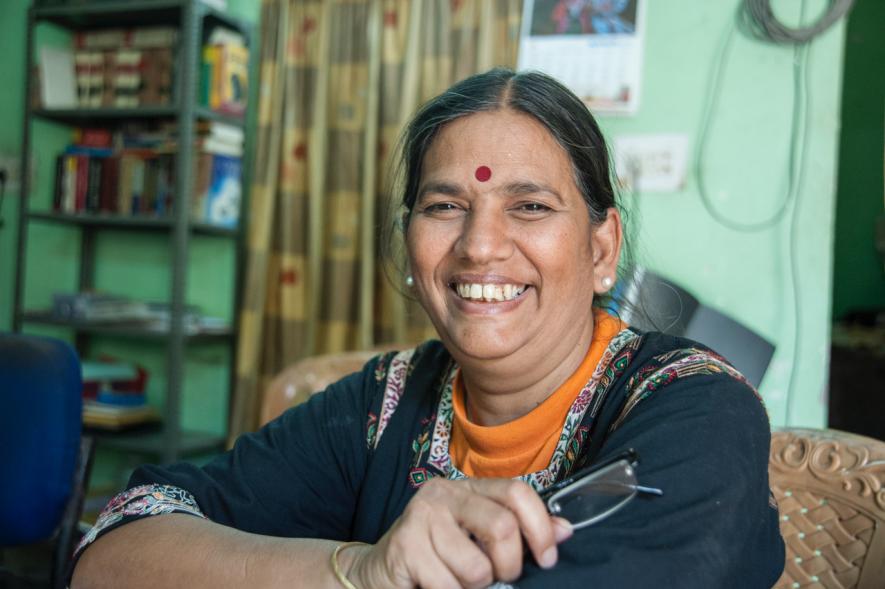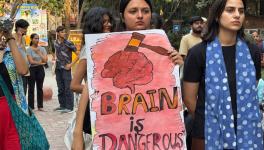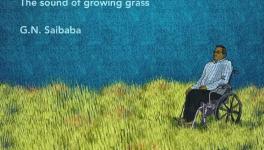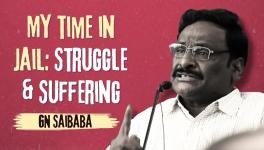My Spirit has not Been Broken: Activist Sudha Bharadwaj

This is the second part of the interview with Sudha Bharadwaj, who was arrested on 28 October 2018 for her alleged role in fomenting the 2018 Bhima Koregaon violence. (The first part can be read here.) In this interview, she speaks on her privileged class background, why she gave up her American citizenship, what made her shift to Chhattisgarh, where she worked among industrial workers to better their lives, about how she spent time in jail, and her anxiety of being separated from her daughter. Bharadwaj discusses how she hopes to adjust to a life of limited freedom.
Limited Freedom? After spending nearly three years in jail, Bharadwaj was released on bail last month. Her bail conditions proscribe her from leaving Mumbai, although she has now been allowed to live in Thane, and speaking on the Bhima Koregaon case. NewsClick did not ask her any question on the case, and she politely refused to answer any question she thought was even remotely connected to it.
When you were arrested, newspapers were awash with stories on your privileged past—daughter of top-notch academicians, went to the Indian Institute of Technology, Kanpur, could have got a cushy job—and yet went to work among industrial workers in Chhattisgarh. What made you opt for a path the middle class does not often take?
I do have a very privileged background. My mother was a professor and one of the founders of the Centre for Economic Studies and Planning, at Delhi’s Jawaharlal Nehru University. JNU was an interesting place for a child. There were discussions and debates. As a child, I remember participating in the celebration of Vietnam’s liberation. I remember the mashaal [torchlight] march that JNU students took out on Indira Gandhi’s defeat in the post-Emergency General Election. We were surrounded by people who were trying to change the world, not just make careers. JNU’s environment imbibed in me a sense of social responsibility.
Thereafter, you went to IIT, Kanpur, to do mathematics, which awes most people.
I joined IIT in 1979 and passed out in 1984. In 1982, Delhi hosted the Asian Games. Near JNU, a huge camp for construction workers, with a barbed-wire fence around it, was established. They were building the stadia and five-star hotels for the Games. I would come down from Kanpur to Delhi [during holidays]. Groups from JNU and AIIMS [All India Institute for Medical Sciences] would go to the camp. Medical interns would treat workers. We would teach their children.
The misery in the camp was horrifying. Once, a student spoke to a labourer from Odisha in his language. He broke down. He said his family members were ill, but he had been disallowed from going home. His status was like that of a bonded labourer. When we went to the camp next, that labourer had disappeared. I got a shiver down my spine. I realised working for the poor cannot be for a day or two.
Just that experience made you opt for social activism?
There was a strike in the Delhi Cloth Mill, in 1983 or so, against the arrest of Shankar Guha Niyogi [the iconic trade union leader], who had been arrested. This was the first time I heard of Niyogi. We joined the campaign for Niyogi’s release. When he was let out of prison, he wanted to meet the students who had campaigned for his release. He was very happy to meet us. Curious, I made a couple of trips to Dalli Rajhara [a mining town in Chhattisgarh], which is captive iron ore mines for the Bhilai Steel Plant. Dalli Rajhara was where Niyogi had his union—the Chhattisgarh Mukti Morcha. I was completely taken in by the union.
What was so unique about the Chhattisgarh Mukti Morcha?
The union was there not just for economic struggles. They were running schools and hospitals, trying to get people off alcohol, and fighting for the rights of women. The Morcha had a cultural team. They would talk about the Adivasi hero, Veer Narain Singh. Despite my mother’s apprehensions, I made up my mind to join them, in 1986. I, initially, taught in the schools that the union ran. I then got involved in unionising workers. I shifted, in 1990-91, to Bhilai, where a new movement to regularise contract workers had begun. It was then that Niyogi was assassinated. I just stayed on.
Did you face violence or threats of it while unionising workers?
I did not encounter intimidation while unionising workers, but all around there was so much violence against our leaders and karyakartas [workers] that it was as good as personal. A little before the assassination of Comrade Niyogi, at Simplex Urla in Raipur, a big group of goondas waving swords emerged from the factory and attacked workers sitting on dharna. Four of them were grievously injured, their arms slashed to the bone. Niyogi met the President of India with these injured workers in mid-September, and submitted a petition signed by 50,000 citizens. Niyogi was murdered within a fortnight of meeting the President [on 28 September 1991}.
How difficult was it for you to de-class yourself?
One of Niyogi’s important principles was that all middle-class activists were supposed to be under the working-class leadership. We lived amongst workers. It meant learning to gobar lipna our kutcha houses [basically, applying cow dung on the walls and floors of mud houses.]. Psychologically, the most difficult task was to learn to go out in the fields, armed with a stick for chasing away wandering pigs, to relieve oneself. But I got so much affection from my fellow unionists and mohalla residents that I felt I was in the union’s lap. It is only occasionally that I would feel nostalgic about something silly like wanting to read a PG Wodehouse or meeting old college chums.
When did you become a lawyer?
After the assassination of Niyogi, there were many cases to handle. As an educated person, I was mediating between the workers and the lawyers. The workers would tell me, “Didi, we cannot afford these lawyers. And, anyway, we do not know which side they are on.” The union was fighting against big corporates—and you could never tell [who had been bought out]. They said you had better become a lawyer. In 2000, I became a lawyer at the ripe age of 40 years.
Before your transformation, you had an American passport. When and what made you opt for Indian citizenship?
I was an accident (laughs heartily) born to my parents, who were on post-doctoral fellowships in the United States. I was there for just a year. I came back. After that, when I was four years old, I went with my mother to Cambridge University. I was 11 when I returned.
When I turned 21, I was free to choose whether I wanted to be Indian or American. I chose to be Indian, basically, because I was already involved in social issues by then. At 23, I gave up my American passport.
Is it true that when you went to the American Embassy to surrender your American passport, its officials tried to dissuade you from giving up your American citizenship?
The story is very funny. I went to the US Embassy along with my mother, [economist] Jayati Ghosh and Prof Sunanda Sen (Laughs). We saw this long queue; that was for visas. I marched to the gate, and I was politely told to get into the visa queue. I said I was an American passport holder. The four of us were ushered in.
When I told the gentleman why I had come, he said, “You want to do what?” I said, “I want to surrender my American passport and become an Indian citizen.” I explained that both my parents were Indian citizens. And I, anyway, wish to be Indian.
So he said [she mimics his accent], “Are you sure you have discussed with your father? Are you sure you have discussed with your husband?” [She laughs] I am not joking. He, really, thought these four kooky women had come on their own, without discussing the issue with a male member in the family.
Since I insisted, he went to look for a form [which a person fills up to relinquish citizenship] but could not find one. He said there was not a form around because no one had asked for it in Delhi. He said he would ask for the form and that I should come after a week. “But please, do give it some more thought,” he said. [Laughs again.]
I returned to the Embassy after a week. I was given the form. I was told by this very concerned gentleman, “Please remember, the step you are taking is a very serious one.” I said, “Of course, I know that.” He said, in all earnest, “You know, they will never let you join the American Army.” [I join her as she laughs uproariously.] And I said, “Well sir, I don’t think I want to join the American Army.” After that, I took an oath that I was giving up my American nationality.
To become Indian was a political choice for you, unlike most of us. Does the fact you chose to become Indian impact your attitude?
Most others in my batch in IIT opted to become American citizens. I love this country, and I want to do something for its people. Also, I did not want to have my visa renewed every six months and be told that I couldn’t do this, I couldn’t do that—or else I would get deported.
Anyone who has a notion that I made a sacrifice should be disabused of it. The choice I made was because I did want to make life better for the people around me. At no point have I regretted it. At no point I wished I was in the United States.
They might not have come after you had you been an American citizen.
They could have politely asked me to go back to ‘my country.’ [Laughs again].
Nevertheless, they came after you. You were arrested and taken to Pune in October 2018—and lodged in the Separate Yard Cells of Yerawada Jail. What does the Separation Yard Cell mean?
Imagine a large cage, with a corridor, beyond which are the cells. Sen was in the cell adjacent to mine. There were two other women there, both sentenced to death. They had been in jail for 25-26 years. We were not allowed to step out of the cage-like structure, apart from 30 minutes, between 12 pm and 12.30 pm, to soak in the sun. In those 30 minutes, other prisoners would be inside barracks.
Both you and Prof Sen could talk to the other two women?
Yes, we could. But they had spent such a long time in jail that they had become very bitter—and difficult to interact with.
So apart from Prof Sen, the two women prisoners and odd constables at Separate Yard cells, you could not interact with anyone.
Practically, it did not work out that way. For one thing, Yerawada had water shortages. We had to go fill four buckets with water from hand pumps and lug them to our cells. Or we would be let out to get stuff from the canteen. Prisoners are allowed to keep Rs. 4,500 with themselves. When we would be taken to court, we went in the same van as others. In all these moments, we did interact with others.
You were not allowed to have food with others?
No, we had our food in our cells.
It seems the attempt was to break your spirit.
(Laughs heartily) My spirit has not been broken.
It must have been hard on you to be separated from your daughter Maaysha.
I had spent a good 30 years of life, between 1986 and 2016, in Chhattisgarh. I came to Delhi in 2017 because I wanted to give time to Maaysha. She was on the verge of going to college and had a career to make. For 30 years, I had worked from morning to night, as a lawyer, as an activist.
There was also the awareness that I needed to make some money, as I hardly had any savings, to give Maaysha a good education. So I took up a job as a visiting professor at the National Law University, Delhi, in 2017. It had been extended until 2019. It was then that I was arrested.
[Laughs] After I had devoted 30 years working for others, just when I made up my mind to be there for my daughter, they came for me. Maaysha was left alone. Of course, there were people around. They helped us as much as they could. But it was a big shock for her. I am really proud that despite all the pain she went through, she managed to get admission to St. Thomas College in Bhilai and is in the second year of BA Psychology.
In an interview with me, she did say she wanted to become a psychologist.
She did all this in the midst of my arrest, missing me, coming over to the jail to meet me. Maaysha was my biggest anxiety in jail. She would write to me. By the time the letter would reach me by post, many days would have passed since she wrote it. They would spend three days censoring the letter before handing it over to me. I would then reply to her. They would take three days to censor the reply and post it. The letter would take a week or so to reach her. I would feel so helpless when she would express her pain and anguish. I could do nothing to comfort her. During the pandemic, we were allowed to make phone calls. That was much better.
But before the pandemic, how often could you meet her?
When I was in Pune’s Yerawada Jail, she had to come from Delhi or Bhilai to meet me. She would come to meet me once in three months. She could not do it more frequently than that. We were allowed a mulakaat once a week. So she would meet me on Saturday and then on Monday. In a face-to-face meeting, you are allowed 15 to 20 minutes, depending on how nice the constable was. [Laughs].
Face-to-face, separated by a glass wall?
Yes, we could not touch each other. There would be a telephone on her side and a telephone where I would be. We talked over the telephone. They could, of course, tape us, not to say that there was anything worth taping. (Laughs).
Did she cry before you?
She cried many times.
And you could not hug her?
No, palm over palm, separated by a glass wall, that was all we could do to show our love for each other. She would also time her visits with the court hearings. In case there was a nice guard, he would say, “Beti hai, let her go.” We would then hug each other. Everything depends on the whims and fancies of a particular person. If she would bring something for me to eat, they would not let her give it to me.
How difficult was it to pass the time in jail?
In Yerawada, we were alone and so passed the time reading and writing. We would read newspapers from the first to the last page do the puzzles. I did a fair amount of writing in Yerawada.
Like what?
Writing notes on jail, on people lodged there, their cases. In Mumbai’s Byculla Jail, where I was transferred in February 2020, I lived in barracks. Word got around that Sudha Auntie could write legal applications. I ended up writing a lot of applications to get interim bail during the pandemic. They would give me their papers to read so that I could tell them the points they could raise with their lawyers. In one and a half years, I did more legal aid than what I had done in my entire life. [Laughs].
Where were you during the brutal second wave of 2021?
In Byculla Jail. Fifty-six people had tested positive for the virus and were sent to the Covid centre, which was outside the jail. But a large number of people, including me, became sick but had tested negative. I had a low-grade fever and month-long diarrhoea. We were put in a barrack that had been turned into a quarantine centre. Social distancing was impossible. We were, literally, sleeping on strips of floor, next to each other. We shared a bathroom. Nobody came to clean the barrack, and even the food was handed from outside the barrack to us.
Books, it is said, are an escape for the educated in jail. Did you read much?
In both Yerawada and Byculla, we struggled to get books. In Yerawada, there was a library in the male section. Some books would be brought to the female section. In about two years of my stay in Yerwada Jail, I learnt Marathi. The script is Devanagari, and even though I did not know Marathi, I learnt the language. I read Anne Frank’s diary in Marathi. [Laughs] I am good at languages.
I got a court order to get books. A friend got me a very nice book by Naomi Klein, This Changes Everything: Capitalism vs the Climate. I started translating it into Hindi, completed three chapters. I think the book should be read by all activists fighting against displacement. I requested some of my friends to approach Klein. She was very supportive of my endeavour. But I could not complete the translation as I was transferred to Byculla Jail, where I was busy writing applications and reading the legal papers of other prisoners.
Now that you are on bail, have you adjusted to the new life?
It is a mixed feeling. I am a bit anxious. I do not have a house, I do not have a bank balance, do not have a job. I have a daughter to support. I have a case against me. [Laughs] I have fees to pay to the lawyer. But I am blessed. I have friends who have been kind to me, who have been courageous to provide sureties for me… Ever since I was bailed out, I have spent most of my time collecting documents pertaining to my sureties. That should be over soon.
The next question is how to earn one’s living. As such, I like Mumbai. It is a city of working people. It does not have the pretensions of Delhi. But Mumbai is also an expensive city to live in.
Why don’t you start teaching?
I would love to teach. The point is, who will give me a formal employment with the stigma of the case associated with me. I do not think it is practical for them. Friends in Chhattisgarh say, “Didi, aap asmaan se giri aur khajoor par atak gain.” [Laughs). [Basically, a Hindi proverb which, in her circumstance, would mean, “You emerged from Byculla and have got stuck in Mumbai.”] I can talk to them. The most important thing is that I got time to spend with my daughter.
When I wrote an email requesting you for an interview, I was reminded of Bob Dylan’s line that I read years ago: “My good friends ask me/ how does it feel to be free/I reply to them mysteriously/The birds in the sky are chained to the pathways of sky.” Can you relate to these lines?
[Laughs] That is me. I came out of the cage, but I am still tethered. But I have the freedom, for instance, to talk to you—and that is big. [Laughs]
Ajaz Ashraf is an independent journalist
Get the latest reports & analysis with people's perspective on Protests, movements & deep analytical videos, discussions of the current affairs in your Telegram app. Subscribe to NewsClick's Telegram channel & get Real-Time updates on stories, as they get published on our website.
























